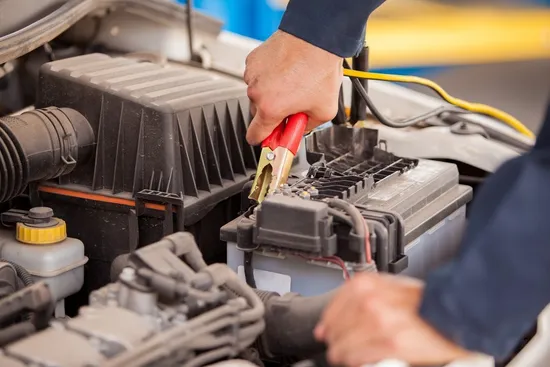Your car’s electrical system revolves around its battery. This critical power source facilitates everything from engine ignition to the operation of exterior lights and interior accessories. Even so, many owners give little thought to their car battery until it actually fails and requires replacement.
The more you understand about car batteries, the more effectively you can recognize trouble signs, keep your battery working well, and select the right kind of battery for your needs. Check out the answers to these frequently asked car battery questions.
How Do Different Types of Batteries Compare?
Most cars and trucks use standard lead-acid batteries. A lead-acid battery, also referred to as a wet cell or SLI (starting, lighting, and ignition) battery, combines a water-acid solution with metallic plates in a series of six internal cells to generate power. Terminals connect the battery to the vehicle’s electrical system.
You can also find batteries that offer enhanced performance compared to standard lead-acid batteries. Both enhanced flooded batteries (EFB) and absorbent glass mat (AGM) batteries work on similar principles but offer more charging cycles and deeper charging power, making them good for automatic stop-start systems.
Deep cycle batteries can provide greater amounts of reserve power than SLI batteries, delivering lower levels of energy over a longer period. However, they can’t deliver as much startup power as standard batteries. If you own an RV, you might use them to power the RV’s living amenities on extended road trips.
Why Do Batteries Lose Power?
The voltage level produced by a lead-acid car battery depends on how much sulfuric acid its water-acid solution contains. A fully-charged 12-volt battery should generate at least 12.6 volts of electricity. However, over time the sulfuric acid concentration will diminish, reducing the battery’s voltage output.
This loss of voltage doesn’t always occur gradually. For example, a car battery can discharge overnight if you leave your lights on. Even a dome light or other tiny electrical component can drain the battery. A faulty electrical system may continuously trickle electricity to accessories without your realizing it.
Mechanical problems often lead to battery problems. A malfunctioning alternator diode can keep circuits closed that would normally remain open, draining the battery. Extreme temperatures and excessive short trips can cause premature battery wear. Corroded battery terminals or cables may fail to recharge your battery.
When Do You Need to Replace Your Battery?
If an underlying mechanical issue threatens your battery life, you may extend the battery’s performance simply by dealing with that issue. Your auto technician can remove battery corrosion, replace bad cables or alternator parts, and locate circuitry problems that drain your battery.
Eventually, all car batteries reach a point of no return. Watch for specific warning signs that your battery can no longer deliver the power your car needs. Symptoms include dim or flickering headlights, difficult starting (or a refusal to start), and a clicking sound from a starter solenoid that doesn’t receive enough power.
How Can You Prevent Battery Problems?
Some simple preventative measures can help you get the expected life expectancy from your car battery. First and foremost, schedule regular maintenance inspections that include battery voltage checks. Even if the battery seems fine, your technician may spot unusual electrical activity that might promote drainage.
Smart driving habits can also help you spare your battery from an untimely death. Always make sure that you’ve switched off all lights or other electrical devices after driving. Unplug any chargers or devices that might cause a phantom power drain. Plan your drives to minimize unnecessary short trips and/or extreme temperatures.
Powers Transmissions can keep an eye on your car’s battery life, test voltage levels, and swap out an ailing, aging battery for a fresh, new one. Contact us today with any additional questions you may have.

